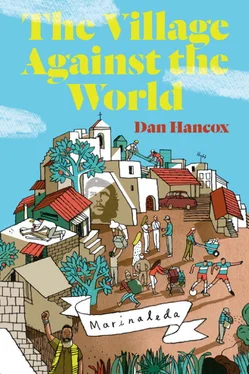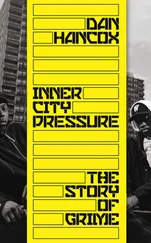The Asterix analogy is actually less glib than it sounds: the village of Marinaleda is an implausible, tiny exception to the rule of a seemingly impregnable empire – a liberated space, a labourers’ island in a sea of latifundios . Unlike Asterix’s Gaulish village, however, Marinaleda carries a paradox at its very heart: it is founded on a powerful leadership cult around one truly remarkable individual, but its politics are, above all, the primacy of people power. These politics are sincerely felt, and almost always sincerely executed. Everyone is equal, and everyone fights together, on behalf of everyone; but the marinaleños do so most passionately, and most successfully, when Sánchez Gordillo is holding the megaphone.
This is perhaps closer to the continuum of nineteenth-century Andalusian anarchism than it first appears. In the information age, using the mass media in the way Sánchez Gordillo has done is an appropriate and necessary form of ‘propaganda of the deed’. The deed itself is integral, whether a hunger strike, an occupation or a raid – but the way it is received is, too. In response to the August supermarket raids, many Spaniards said they thought his methods crude, but far fewer disagreed with his message. Because, for all the mainstream media’s flaws, systemic and individual, the question remains: why is it that they fixated on him? Why do Sánchez Gordillo’s headline-grabbing actions work? In part, perhaps, because he’s a charismatic, polarising character; but mostly because people want to hear what he has to say. The megaphone may be shrill, but the words coming out of it have always chimed with the public – all the more so because nobody else in Spanish politics was daring to say them.
Sánchez Gordillo has delivered many fine and memorable epigrams over the years, some of which I have heard in person, in private discussion, or from a platform, and others in speeches or in articles in days of struggle gone by. There are more elegant and profound quotations, but it is this one that sticks with me: ‘Because we fight together, because we make our lives together, there is a high degree of good neighbourliness. When we plant trees, we do that together too.’ It is this kind of communism that is Marinaleda’s triumph – an almost ineffable sense of solidarity.
No one ever forgets ‘that strange and moving experience’ of believing in a revolution, George Orwell reflected, after arriving in Republican Barcelona on the brink of civil war, a society fizzing with energy as it fleetingly experienced living communism. Marinaleda is neither fully communist nor fully a utopia: but take a step outside the pueblo and into contemporary Spain, and you will see a society pummelled, impoverished and atomised, pulled into death and destruction by an economic system and a political class who do not care, and have never cared, whether the poor live or die. Sánchez Gordillo’s achievements are more than just the concrete gains of land, housing, sustenance and culture, phenomenal though they are: being there is a strange and moving experience, and, as Orwell suggested, an unforgettable one.
In the eight or so years I have known about Marinaleda, I have sometimes had to remind myself of the gap between the grandiose claims made about the village, by left and right alike, and the humble size and intimacy of the place itself. It is a village which means so much to so many people, across the world; but it has only 2,700 inhabitants, and whole hours can pass where the greatest noise and excitement emanates from a motorcycle speeding down Avenida de la Libertad, or the vocal exercises of a particularly enervated rooster.
It is both poignant and appropriate that Sánchez Gordillo seems to see no bathos, or discrepancy, in devoting as much attention and passion to the local specifics of the pueblo – the need to start planting artichokes this month, not pimentos – as he does to the big picture, persuading the world that only an end to capitalism will restore dignity to the lives of billions.
The big hitters of the Spanish mainstream press might not have noticed that Sánchez Gordillo was unwell, but the steady stream of left-wing enthusiasts visiting the village were finding out upon arrival. At a table outside Bar Gervasio I watched Sergio, the smart young councillor with the black stubble and the black jeans, unblinkingly try to explain to Uzma, the British documentary-maker, that it was ‘normal in political life to be away sometimes’. I don’t know where he is, and he’s ill, Sergio explained; ‘I’m not connected with him.’
‘ Hombre , you’re famous!’ shouted one of Sergio’s young friends as he walked past us. Sergio looked sort of proud and embarrassed at the same time. In his mid-twenties, he’s by far the youngest councillor in the village, though only a decade younger than the new leader of IU, Alberto Garzón – a man identified more with the indignados than with established party politics. The future political direction of this generation, who not only do not remember fascism, but were not yet born when Franco died, is going to be critical to Spain’s future – not least because they are the ones weathering the jaw-dropping 57 per cent rate of youth unemployment and awkwardly squeezing back into corners of their parents’ homes.
Sergio recalled his mother telling him they were on strike when he was three years old. He did not, he laughed, know what it meant, but remembered noticing even then that something in the routine of his young life was different. ‘By the time I was twelve or thirteen, I was conscious about the situation in the village, and how it was different from other villages, from talking to my sister and my mother, and going on my first demonstrations. I remember so many demonstrations, so many. The big one was when I was eighteen, going to Seville, and being in the big city, in front of the parliament of Andalusia. Seeing power for the first time was a revelation. I realised politics must be more than just passively choosing between two identical parties.’
His scepticism about all mainstream politics is that of an ever-growing majority in Spain. ‘A pox on all their houses’ has become more than just an offhand expression of apathy, so common in Western capitalist countries: it is an increasingly fervently held wish, as contempt is transformed into anger. For Sergio, the most important issue facing Marinaleda during the crisis was, in a sense, the same as it ever was: trying to persuade the central authority that work, shelter, culture, and life without undue interference – whether you call that freedom or autonomy – were all basic human rights.
‘Marinaleda has been important twice in its hundreds of years of history. The first time was in the late 1970s and early 1980s, when we had the Transition, and that was a crisis really, a crisis of democracy, trying to find a way out of the fascist state, a way out of dictatorship. Right now, this is Marinaleda’s second moment. Look at the rest of Spain. During the better economic times, people weren’t watching us. Now they are all coming here. It’s an economic crisis, a political crisis, a crisis of corruption – it’s a systemic crisis.’
‘Are you optimistic about the village?’ I asked, alluding to the situation with the peonadas , and the collapse in funding they were getting from Seville.
‘The situation with work is critical right now,’ he agreed. ‘It’s complicated, with the peonadas , but critical. But of course I’m optimistic. If I wasn’t, I wouldn’t be working on this project. It’s a real alternative to the crisis, and I believe the rest of the capitalist world can be different, too. I’m aware that Marinaleda has advantages and disadvantages, but we can be an example.’
Читать дальше












